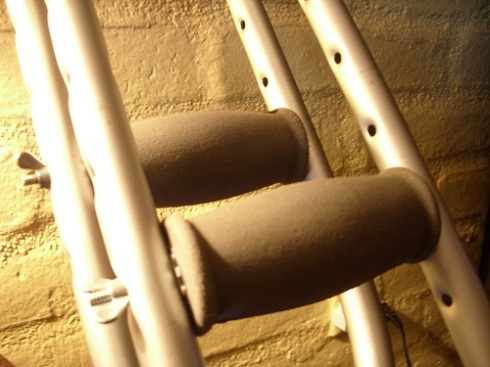Regardless of where you are on your spiritual pilgrimage, you have shared or heard this view of Christianity. Karl Marx famously coined the phrase, “Religion is the opiate for the masses”. Many believe that religion is designed for people who are incapable of dealing with life’s turbulences. Critics believe these are people that are emotionally “weak” therefore they need religion. This usually reinforces the idea that those who can face life without religion are “stronger” or “braver” for staring life in the face without a “crutch”. Sadly, I think many Christians react in knee-jerk fashion and frenetically try to prove all the ways Christianity isn’t a crutch. This misses the heart of Gospel.
Just examine the statement: “Christianity is just a crutch for the weak”. The implication is that the veracity of the claims of Christianity is somehow rendered impotent because it serves as a crutch. But does being a crutch warrant this criticism? Maybe you share this criticism. If so, consider this – do you look at a paraplegic in a wheelchair with disdain or disapproval and say, “Wheelchairs are just for the weak”? Probably not. You likely ascertain the reason for the wheelchair – their debilitating physical condition – and think nothing further. You definitely don’t denigrate the wheelchair because you agree on its necessity. Calling Christianity a crutch is a smokescreen. We don’t honestly have anything against crutches, wheelchairs, slings, etc. We have a problem with seeing OURSELVES as crippled therefore to be called as such, is offensive. Who wants a wheelchair when they believe their mobility is uninhibited?
This analogy doesn’t go far enough though. Consider Paul’s words in Ephesians 2:1-5
“1 And you were dead in the trespasses and sins 2 in which you once walked, following the course of this world, following the prince of the power of the air, the spirit that is now at work in the sons of disobedience—3 among whom we all once lived in the passions of our flesh, carrying out the desires of the body and the mind, and were by nature children of wrath, like the rest of mankind. 4 But God, being rich in mercy, because of the great love with which he loved us, 5 even when we were dead in our trespasses, made us alive together with Christ—by grace you have been saved”
The Gospel is offensive because it begins with the ultimate anti-self-esteem message, “You are worse than crippled, you are spiritually dead”. Throughout scripture we are called “dead in our sins”. This doesn’t bode well for those us who pride ourselves on our “bootstrapping” abilities. When life gets hard, we fight back, make lemonade, become the captain of our own ships, etc. Christianity isn’t offensive because it is a crutch, its offensive because it kills your ego.
Responding to this rebuttal with a salvo of apologetic arguments proving that Christianity isn’t a crutch fails in showing why the Gospel was and is necessary in the first place. The truth is that almost every person in history (with the exception of Adam, Eve and Jesus – but that’s for a different post) to breathe air was born spiritually stillborn. You and I were born with a condition called sin that, by its very nature, desires to rebel against God and place ourselves on the throne of our own hearts and lives. Psalm 51:5 reads:
“Behold, I was brought forth in iniquity, and in sin my mother conceived me.”
Genesis 8:21 reads:
“…the intent of man’s heart is evil from his youth.”
In the first verse I listed, Paul refers to believers as once being “children of wrath”. This doesn’t mean that we are meandering about slashing people’s tires and Achilles (it doesn’t mean we are as bad as we could be) but it does mean that our hearts will naturally never desire to relate to God rightly on their own.
We were born without a spiritual heartbeat. In this way, crutch may not be a harsh enough word to describe Christianity. In the mid 90’s I spent a high school internship at the University of Wisconsin’s hospital with one of the only 2 neuro-pathologists in the state. The doctor and his team were known for being the group that did Jeffrey Dahmer’s autopsy. Every Tuesday was scheduled for brain cutting and autopsies, at which I was required to attend. Needless to say, for a 16-year-old kid, this experience was surreal and not for the faint of heart. I remember a woman being rushed into emergency surgery on a Monday and I believe the next Tuesday was on our table having died. As we began her autopsy, one of her arms was slightly bent and it needed to be straightened. I was asked to straighten it! Rigor mortis had set in so moving her arm just a few degrees would be a little difficult and although she was dead, I was still afraid of hurting her for some reason. As I straightened it, her arm made a cracking sound and I just wanted to whisper, “I’m sorry”. I knew that if she was alive, this would be unbearable pain. Her arm could have even been broken, but no one would know.
This has stuck with me for 17 years because I believe this is the closest picture I have of what it means to be spiritually dead. Much like this woman, outside of the work of the Gospel, we have no clue we’re even dead. The woman had no cognizance of the physical trauma her body was under, therefore she couldn’t respond. Her physical heart had stopped beating.
The Gospel is a crutch, but it’s much more than that. It’s God’s story about how He’s been on a mission to restore what sin has marred and destroyed, including relationship with Him. He promised in Ezekiel 36:26:
“And I will give you a new heart, and a new spirit I will put within you. And I will remove the heart of stone from your flesh and give you a heart of flesh. “
He takes those that are His enemies by nature, makes them into vessels of His mercy, and adopts them into His family by giving them the ultimate heart transplant! He did this by suffering a horrific, bludgeoning death in our place so that we could be made into spiritually alive, and therefore no longer unacceptable enemies. 2 Corinthians 5:21:
“God made him who had no sin to be sin for us, so that in him we might become the righteousness of God”.
Criticizing Christianity for being a crutch really is a misplaced criticism because the one levying it isn’t being honest about their actual point of contention. Crutches don’t bother us as much as our feebleness does. We want to feel strong, brave, significant, empowered, etc. The Gospel doesn’t afford us this luxury, and this is offensive although it can be quite liberating. You no longer have to work tirelessly to seek approval, status, acceptance, affirmation! This gets tiring eventually because once you achieve approval for a short time, now you’ve got to work harder to maintain it. It is a heart posture that collapses within itself.
I will close with this tragic piece of history. During World War II, from September 17th to September 25th, the Allied Forces planned a military operation called Operation Market Garden in the Netherlands and Germany. Up to this point, this was the largest airborne battle ever. The over-simplified version of the plan was to have allied forces parachute into strategic locations and secure bridges allowing for rapid advancement into northern Germany. This would come to be known as one of the largest Allied failures of the war. On day 5, the Polish 1st Independent Parachute Brigade was airdropped into Germany, but due to a number of issues (logistics, poor communication/intel, and the Nazis retrieving a copy of the operation from a dead allied soldier), the Polish parachuted into enemy territory. While floating through the air, they were under heavy enemy fire. The Polish would eventually lose 2/3 of this brigade. Imagine what must have been going through their minds! They saw imminent death before them, with little to no hope of rescue.
As difficult as this is to revisit, this gives us a look at the nature of our spiritual condition. If you pride yourself on being “strong” enough to make it without a “crutch”, you are missing a vital reality. You are parachuting inevitably into enemy territory, with no hope of survival. You think that your greatest need is to navigate the difficulties of life, and since you’ve done so without the help of Christianity, it isn’t for you. But you’ve misidentified your greatest need. We all need to be made alive. We all need a heart transplant. We all need the Gospel.

